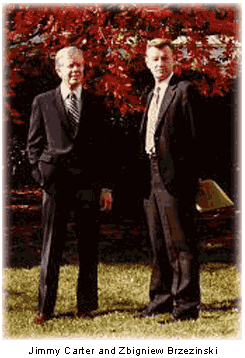Zbigniew Kazimierz Brzezinski was a political mover and shaker, beginning with the 1960s when he was a foreign policy advisor to the Kennedy and Johnson administrations during the Vietnam War. Although a Democrat, Brzezinski was a hawkish hardliner, the antithesis of Henry Kissinger and the Nixon White House.
The early years
Brzezinski was born the son of a Polish diplomat, in Warsaw on March 28, 1928. He spent part of his youth in France and Germany before his father was posted to Canada in 1938.
Brzezinski received his B.A. and M.A. in political science from McGill University in Montreal in 1949 and 1950 respectively. His doctorate in political science, which focused on the Soviet Union's evolution from the October Revolution to Stalinism, was earned from Harvard in 1953. He became a U.S. citizen in 1958.
Brzezinski taught at Harvard until he was denied tenure, then moved on to Columbia University in 1959 to become the head of the new Institute on Communist Affairs.
The politico
Early in his post-scholastic years, Brzezinski traveled to Munich to meet with the Polish contingent of Radio Free Europe and later with Carl Friedrich, with whom he would collaborate to advance the theory of totalitarianism as it applied to the Soviet Union.
At Harvard, he had openly disagreed with the Eisenhower-Dulles foreign policy of "rollback,"* arguing that any antagonism toward Eastern Europe would incline them toward the Soviet Union. At Columbia, he became aligned with the Council on Foreign Relations and wrote Soviet Bloc: Unity and Conflict, which dealt with Eastern Europe since the Cold War.
In the early 1960s, Brzezinski counseled both Kennedy and Johnson, and advised a policy supporting Detente and non-anatagonistic policies following the Cuban Missile Crisis. He also supported Johnson's Great Society and civil rights policies in 1964.
Regarding the Soviets in that time frame, Brzezinski opined that the leadership, apre Khrushchev, lacked "creativity." He also warned against French leader Charles DeGaulle's vision of a "Europe from the Atlantic to the Urals."
He supported U.S. involvement in Vietnam to confute China's assertion that the U.S. was just a "paper tiger." Later, he advocated de-escalation in Southeast Asia.
In 1970, Brzezinski wrote Between Two Ages: America's Role in the Technetronic Era, a model for the establishment of the Trilateral Commission, which came into being in 1973 with Brzezinski becoming its first director. The group was brought together with the help of David Rockefeller. It comprised prominent politicians, business leaders and academicians from the U.S., Western Europe and Japan, with the avowed purpose of strengthening and promoting relations among the three regions.
 One of those new members was Georgia governor Jimmy Carter. When Carter declared his candidacy for the White House in 1974, Brzezinski, a critic of the Nixon-Kissinger foreign policy style, became Carter's advisor on foreign affairs. Later, Carter named Brzezinski his National Security Advisor.
Brzezinski was as much to the left as Kissinger was to the right, and wanted to replace Kissinger's "stuntman acrobatics" with a foreign policy "architecture." He emphasized further development of the U.S.-Sino rapprochement, supported a new arms control agreement with the Soviets, and agreed with Carter's and Secretary of State Cyrus Vance's opinion that the U.S. should pursue international cooperation in its dealings instead of shouldering the entire burden.
In the atmosphere of 1979 and 1980, when the U.S. was struggling with a declining economy brought on by rapidly rising fuel prices, theIranian hostage situation, and the Soviet invasion of Afghanistan, Brzezinski's anti-Soviet Union stance gained ground but could not put an end to the Carter administration's vexation.
Since his tenure in government service, Brzezinski has been in and out of the public eye, teaching, writing, speechifying, and meeting occasionally with government leaders.
One of those new members was Georgia governor Jimmy Carter. When Carter declared his candidacy for the White House in 1974, Brzezinski, a critic of the Nixon-Kissinger foreign policy style, became Carter's advisor on foreign affairs. Later, Carter named Brzezinski his National Security Advisor.
Brzezinski was as much to the left as Kissinger was to the right, and wanted to replace Kissinger's "stuntman acrobatics" with a foreign policy "architecture." He emphasized further development of the U.S.-Sino rapprochement, supported a new arms control agreement with the Soviets, and agreed with Carter's and Secretary of State Cyrus Vance's opinion that the U.S. should pursue international cooperation in its dealings instead of shouldering the entire burden.
In the atmosphere of 1979 and 1980, when the U.S. was struggling with a declining economy brought on by rapidly rising fuel prices, theIranian hostage situation, and the Soviet invasion of Afghanistan, Brzezinski's anti-Soviet Union stance gained ground but could not put an end to the Carter administration's vexation.
Since his tenure in government service, Brzezinski has been in and out of the public eye, teaching, writing, speechifying, and meeting occasionally with government leaders.